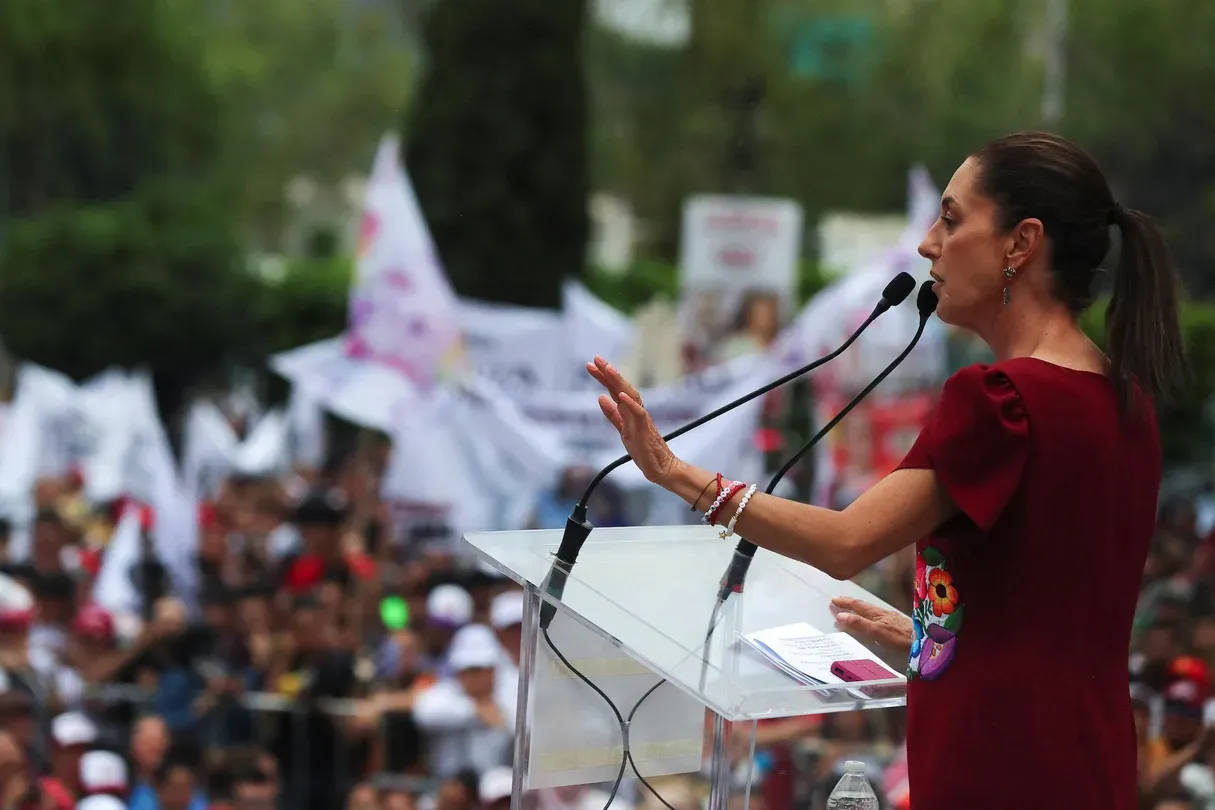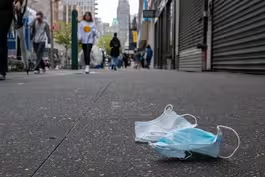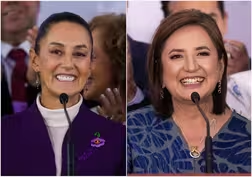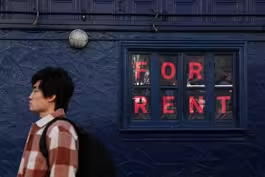

June 1, 2024 - PBS News Weekend full episode
6/1/2024 | 24m 9sVideo has Closed Captions
June 1, 2024 - PBS News Weekend full episode
Saturday on PBS News Weekend, what’s at stake in Mexico’s largest election ever, against a backdrop of increasing gang and cartel violence. Then, how people with disabilities are navigating relaxed COVID precautions. Plus, what’s keeping rents high and what could be done to help those struggling to find affordable housing.
Problems playing video? | Closed Captioning Feedback
Problems playing video? | Closed Captioning Feedback
Major corporate funding for the PBS News Hour is provided by BDO, BNSF, Consumer Cellular, American Cruise Lines, and Raymond James. Funding for the PBS NewsHour Weekend is provided by...

June 1, 2024 - PBS News Weekend full episode
6/1/2024 | 24m 9sVideo has Closed Captions
Saturday on PBS News Weekend, what’s at stake in Mexico’s largest election ever, against a backdrop of increasing gang and cartel violence. Then, how people with disabilities are navigating relaxed COVID precautions. Plus, what’s keeping rents high and what could be done to help those struggling to find affordable housing.
Problems playing video? | Closed Captioning Feedback
How to Watch PBS News Hour
PBS News Hour is available to stream on pbs.org and the free PBS App, available on iPhone, Apple TV, Android TV, Android smartphones, Amazon Fire TV, Amazon Fire Tablet, Roku, Samsung Smart TV, and Vizio.
Providing Support for PBS.org
Learn Moreabout PBS online sponsorshipJOHN YANG: Tonight on PBS News Weekend, against a backdrop of increasing gang and cartel violence, what's at stake in Mexico's largest election ever then how people with disabilities are navigating relaxed COVID precautions.
NAOMI BEN-PORATH: For many of us, we don't have the luxury to think that COVID, as a public health situation is past us.
And so it's been very isolating seeing the national discourse turn in that way.
JOHN YANG: And what's keeping rents high and what could be done to help those struggling to find affordable housing.
(BREAK) JOHN YANG: Good evening.
I'm John Yang.
Israeli Prime Minister Benjamin Netanyahu has thrown up a hurdle to President Biden's proposed path to ending the war in Gaza.
He said there can be no permanent ceasefire until Hamas military and governing capabilities are destroyed.
In a statement, Netanyahu said the notion that Israel will agree to a permanent ceasefire before these conditions are fulfilled is a nonstarter.
On Friday, Mr. Biden said Israel's bombardment of Gaza has left Hamas no longer capable of another large scale attack on Israel, like October 7, and that it is time for this war to end.
The families of Israelis held hostage in Gaza called on both Israel and Hamas to take the deal.
Hamas said it views the president's proposal positively, as do many war weary Gaza residents.
AKRAM ABU AL-HASAN, Displaced Palestinian (through translator): This proposal came late, but better late than never, we hope from God, the American administration and the European Community in general to continue to put pressure on Israel for a ceasefire.
JOHN YANG: Netanyahu also accepted an invitation from the bipartisan congressional leadership to address a joint meeting of the House and Senate.
A barrage of 100 Russian missiles and drones targeted the power grid across Ukraine today.
At least 19 people were injured, eight of them children.
The attack came as Ukrainian President Volodymyr Zelenskyy is attending a defense summit in Singapore.
He's trying to convince more Asian and western countries to supply weapons to his country and cut ties with Moscow.
South Africa's ANC party has lost its majority in parliament for the first time since the end of white minority rule 30 years ago.
The party, once led by Nelson Mandela, got just over 40 percent of the vote in national elections this week.
South Africa is struggling with high unemployment, electricity and water shortages and rampant crime.
And an attempt to launch Boeing's first astronaut flight was called off at the last minute today, the latest in years of technical problems and costly delays for the Starliner project.
The astronauts were in the capsule on the launch pad and just minutes away from heading to the International Space Station when a computer detected a problem and shut down the countdown at three minutes, 50 seconds.
That's one more bit of unwelcome news for Boeing, whose commercial airliners have been scrutinized for safety issues.
Still to come on PBS News, what relaxed COVID guidelines mean for people with disabilities and why rents are still higher in much of the country than before the pandemic.
(BREAK) JOHN YANG: Tomorrow Mexico holds the largest election of its history, nearly 100 million registered voters.
The legacy of outgoing president Andres Manuel Lopez Obrador looms large over the balloting which comes at the time of record levels of gangs and cartel violence.
Ali Rogin looks what's its stake for Mexico and for the United States.
ALI ROGIN: No matter the outcome in Mexico's election this Sunday, the country almost certainly will elect its first woman president.
And voters are hopeful that will bring about change.
CRISTINA ALONSO, Galvez Supporter (through translator): This will be a great step forward because it shows us that we can all do it and that we all have the capacity to move forward, to take a country forward, as other women presidents have done.
ALI ROGIN (voice-over): The leading candidates are Claudia Sheinbaum and Xochitl Galvez.
Polls favor Sheinbaum of the ruling Morena Party.
She's a former Mexico City mayor and protege of the outgoing president, Andres Manuel Lopez Obrador.
Sheinbaum promised to continue the social welfare programs that made Lopez Obrador wildly popular.
CLAUDIA SHEINBAUM, Mexican Presidential Candidate (through translator): This administration's promise to reshape the country is a humanist model, protector of patrimony, better wages and pensions without raising taxes.
ALI ROGIN (voice-over): Trailing her by double digits in the polls is Galvez, a former senator backed by an Alliance of Opposition Parties.
She promises a return to democratic checks and balances that she says have been eroded under the current president.
XOCHITL GALVEZ, Mexican Presidential Candidate (through translator): As president, I will punish the criminals.
Extortion will end.
ALI ROGIN (voice-over): Galvez has been critical of Lopez Obrador's failure to curb the cartel violence gripping the country, a key issue this election cycle.
In the small town of Huitzilac, residents live in a state of constant fear, caught in the crossfire between warring gangs.
ANAHI, Huitzilac President (through translator): When the phone rings, I'm terrified that it will be the school saying, something has happened to my kids.
ALI ROGIN (voice-over): The same fear haunts those seeking public office.
Dozens of local candidates have been killed in the months leading up to the election.
Whoever is elected the new head of state will also inherit a nation grappling with an influx of migrants, shortages of energy and water, and the largest budget deficit since the 1980s.
ALI ROGIN: Joining me to discuss this landmark election is Arturo Sarukhan.
He served as the Mexican ambassador to the United States from 2007 to 2013.
Ambassador, thank you so much for joining us.
Let's start.
Let's talk about these two candidates.
What are they campaigning on?
ARTURO SARUKHAN, Former Mexican Ambassador to the U.S.: Well, the main issue for Mexican voters, the top of mind issue, is public security.
Not only because 33, 34 candidates for elected office have been killed, murdered by organized crime in this current cycle, but because homicide numbers during these six years of the Lopez Obrador administration have skyrocketed.
It's trending down, starting to trend down, but the numbers are still breaking records.
ALI ROGIN: And as we mentioned, Sheinbaum is leading in polls.
She's a protege of Lopez Obrador, also known as AMLO.
What would her presidency look like and what are the chances that she's going to win?
ARTURO SARUKHAN: That's the big question mark.
I think the main issue many Mexicans and international observers are asking is whether she will become her own woman, whether she will be able to wean herself from the shadow of Lopez Obrador, from his ranch in southern Mexico once he leaves office.
She has signaled that she might deviate in some aspects of what has been the Lopez Obrador legacy, but I don't see significant changes in terms of her public policies going forward if she's elected front runner.
But a word of caution, I think polls are going to be what we're seeing in the polls of double digit differences.
I think it's going to be much tighter come tomorrow Sunday, the results could be in the 5 percent difference, and that could trigger challenges both from the losing candidate but also from Lopez Orbrador, because he might argue that the electoral institutions are shaving off votes from his candidate.
ALI ROGIN: Fascinating.
We mentioned that this campaign season has been exceptionally violent.
How has that played into this election?
How has it affected it, especially in those many local races that are taking place?
ARTURO SARUKHAN: Well, we already saw a sign of organized crime muscling its way into local and state political processes in Mexico's 2021 midterm elections.
And then it happened again in two key gubernatorial races on the border with the United States, the state of Tamaulipas, in the state of Guerrero, which is one of the most violent racked states in Mexico.
So the big question mark is A, whether we will see signs of violence on Sunday.
And two, the most important issue is whether organized crime will seek to whip or suppress the vote on behalf of Morena come Sunday.
ALI ROGIN: You talked about national security being an important issue for voters.
What are some of the other animating issues this cycle?
ARTURO SARUKHAN: Obviously, the issue of access to public health because of the evisceration of the Mexican state by Lopez Obrador, a lot of the public health programs have been whittled away.
For example, access to cancer medicines for young kids.
This has been a very pressing issue up and down Mexico.
The issue of jobs in the economy is always a relevant one, particularly when Lopez Obrador, which explains his popularity and the support for Morena is responsible for having raised the minimum wage in Mexico.
And so that's had an important impact in terms of economic perspectives for a very significant number of Mexicans.
ALI ROGIN: Of course, this election comes just a few months before the one that's taking place here in this country.
How will the outcome of these two elections affect U.S.-Mexican relations in the next few years?
ARTURO SARUKHAN: Well, obviously, there's no country more important to the United States than Mexico, and vice versa.
These two countries are joined at the hit for the good, I believe.
But obviously, were the Republican Party that today sees all the roads to the White House going through the border with Mexico, whether it's on immigration, whether it's on drugs, whether it's on the narrative of Mexico as the real national security threat to the United States.
The double dynamic of what happens every twelve years when our two presidential cycles coincides is going to be challenging, particularly if Donald Trump were to return to the White House next year.
ALI ROGIN: And how will the issue of immigration factor into that in particular?
ARTURO SARUKHAN: Well, Lopez Obrador has been weaponizing immigration and his relationship with the United States.
You saw that in December when secretaries Blinken and Mayorkas in the middle of the holidays had to run down to Mexico because Mexico decided to stop deportations, repatriations, particularly Venezuelans, coming into Mexico.
The Mexican government restarted those efforts.
One of the reasons that explains why numbers now on the border have diminished in terms of undocumented immigrants being detained by the border patrol is what Mexico is doing.
But in my view, there is a big question mark out there as to whether Lopez Obrador, who will leave office on October 1st, a full month ahead before Americans go to the polls, decides to open those migration valves to create some -- to exert a bit of pressure on the United States and on President Biden before the election.
ALI ROGIN: A fascinating dynamic to be watching for.
Arturo Sarukhan, former ambassador to the United States, thank you so much for joining us.
ARTURO SARUKHAN: My pleasure.
JOHN YANG: The pace of U.S. COVID-19 fatalities has slowed significantly.
The nationwide death toll stands at more than 1 million people.
With precautions like mandatory masking, social distancing, and isolation no longer in place, it can seem as if worries about the virus are gone as well.
But for many people with disabilities, the threat is still very real.
We asked people in the disability community to tell us about their concerns about this new normal.
NAOMI BEN-PORATH: Naomi Ben-Porath.
I'm 26 years old.
I live in Lowell, Massachusetts.
I have POTS, postural orthostatic tachycardia syndrome.
I would say that the changes in the COVID policies have definitely made me a lot more nervous to be out and about.
NGOZI ALSTON: My name is Ngozi Alston.
I have scleroderma, which is an autoimmune condition.
There's just so much erasure that exists, right?
Like, we are not part of public spaces.
We're not part of mass movement.
We can't be.
They're not safe.
JERMAINE GREAVES: My name is Jermaine Greaves.
My different disabilities are cerebral palsy.
That is a neurological condition that affects the brain and the muscle.
My second disability is hydronitis aperitiva.
That is a chronic skin condition.
I'm just afraid of getting sick and not being able to, like, get through it, you know, that's a real concern for me.
JOHN ROSS: My name is John Ross.
I am a 71-year old widower with chronic lymphocytic leukemia.
I don't go to restaurants.
I don't go into inside places.
JULIE LAM: My name is Julie Lam.
I am immunocompromised.
I have chronic kidney disease.
TERRI HUDSON: My name is Terri Hudson.
I live in Chicago, Illinois.
I was born with spina bifida.
NATALIE LAMPROS: My name is Natalie Lampros.
I am 28 years old.
My current disabilities are, I have a traumatic brain injury, asthma, and then endometriosis.
There's still doctors that I have not seen in over a year because it would require me to take off my mask for the test.
NGOZI ALSTON: The burden is constantly on me as the disabled person, having to ask and advocate for myself, even trying to hang out with friends or people want to come see me, but aren't willing to, like, take the level of precautions that I need them to.
NATALIE LAMPROS: A lot of grief, depression, and feeling very disconnected from our culture essentially.
NAOMI BEN-PORATH: For many of us, we don't have the luxury to think that COVID, as a public health situation, is past us.
And so it's been very isolating seeing the national discourse turn in that way.
JULIE LAM: My social life has strung to zero.
I cannot attend parties.
I cannot hang out with friends like what I used to.
It used to be like, we are in this together now.
No, you do.
You're on your own.
You look after yourself.
JOHN ROSS: I'm thrilled that people are able to get back to their lives and do the things that we all love to do.
But at the same time, we need to also recognize that life is precious.
And we may not be out of the woods completely, even though it seems that way.
JERMAINE GREAVES: The person next to you don't know what chronic condition you don't have.
You don't know what sickness they're carrying around you giving them COVID could be literally life or death.
So I would implore people to think about community when they wear a mask instead of thinking about themselves.
TERRI HUDSON: We should be doing everything we can societally, all of us, to take care of all of us, because there's really nothing that disabled people ask for as far as accommodation and help that doesn't also benefit nondisabled people.
Ultimately, it makes a better world for everyone if we take care of everyone.
JOHN YANG: When the Gallup poll recently asked Americans to name their top personal finance concerns this election year, the cost of housing was second behind only inflation.
More people cited it than at any time since Gallup started asking the question in 2005.
And little wonder.
Rents are well above what they were before the pandemic.
Earlier, I spoke with Diane Yentel, CEO of the National Low Income Housing Coalition, and asked what's keeping rents high.
DIANE YENTEL, CEO, National Low Income Housing Coalition: Also, in some places, rents have cooled from those historic highs.
They've leveled off or are even declining a bit in some communities.
But the rents still remain well above those pre pandemic levels.
Over half of all renters pay more than a third of their income towards rent.
So rental costs are still quite out of reach for the average renter and especially for people with low or extremely low incomes.
JOHN YANG: You say that in some places rents are cooling off, are dipping a little bit.
Where is that and what's going on in those areas?
DIANE YENTEL: It's primarily because either demand is down or supply is up, or in some cases both.
So in some places there are some of the higher income renters who have been able to move into the homeownership market.
So there's a little bit less pressure and demand on the rental market in that community.
In other places, they're building more, and those new multifamily units are starting to come online.
We are still well behind where we need to be in terms of building enough apartments to meet the demand in communities across the country.
And that's why rents overall are stubbornly high.
And it's important to note, even in those places where we are building more, the rents are coming down a little bit from those historic highs, but remain well out of reach for people with the lowest incomes.
And for those lowest income people, just building more apartments won't make housing affordable to them.
Landlords can't build and operate apartments that are affordable to people with the lowest incomes on their own because the rent that those lowest income people can afford to pay doesn't cover the costs.
So that's a basic market failure that requires a government intervention.
And in this case, the form of the intervention needs to be subsidies, rental subsidies, to make those apartments affordable.
JOHN YANG: In a number of states and in Congress, there's a push to limit the corporate ownership of rental units.
Would that have an effect, do you think?
DIANE YENTEL: The research and the evidence has been very clear that by and large, corporate landlords are among the worst actors as landlords.
Corporate landlords are more likely, according to the research, to be serial eviction filers as a profit making tactic.
They're more likely to have homes that are uninhabitable or unhealthy.
So anywhere where we can limit the ability of corporate landlords to use those tactics or even to own those properties, the more we're able to create stability for those lowest income renters in those units.
JOHN YANG: And also last year, when we talked, evictions had gone up again after the pandemic era protections came off.
What's been the trend there with evictions?
DIANE YENTEL: During the pandemic, when policymakers acted in unprecedented ways, we were able to stave off what would have been a historic eviction wave.
But just as those eviction protections expired and those resources were depleted, renters reentered this really brutal housing market where rents were skyrocketing and costs across the board had increased.
Inflation was at a historic high.
So those lowest income renters were really being squeezed.
And we saw, as a direct result, eviction filings rising and breaching and in many cases surpassing pre pandemic levels.
And today we have historic levels of homelessness in communities across the country.
JOHN YANG: You mentioned subsidies to help make low income housing affordable for those with low incomes.
What else can be done?
What else would you like to see done?
DIANE YENTEL: As long as, for example, we have higher income renters who aren't able to enter the homeownership market because of very little supply of homes for sale and high mortgage rates, that means they're staying in the rental market longer, and that's increasing costs for everyone.
For people with the lowest incomes, we need increased subsidies.
We need to increase rental assistance to repair and build more apartments that are affordable to people with the lowest incomes.
We need to make pandemic era programs that were tremendously successful, permanently authorized and permanently funded so that people can absorb a financial shock and stay housed.
And we need to rebalance the power in our housing market that tilts heavily in favor of landlords at the expense of the lowest income renters through robust and enforced tenant protections.
JOHN YANG: Diane Yentel of the National Low Income Housing Coalition, thank you very much.
DIANE YENTEL: Thanks so much.
JOHN YANG: On the latest PBS News Weekly, Israel expands its operation into Rafah, where much of the Gazan population has been seeking refuge.
All that and more is on the PBS NewsHour YouTube channel.
And that is PBS News Weekend for this Saturday.
On Sunday, why car thefts across America in the past four years have skyrocketed.
I'm John Yang.
For all of my colleagues, thanks for joining us.
See you tomorrow.
How lax COVID guidelines isolate people with disabilities
Video has Closed Captions
Clip: 6/1/2024 | 4m 41s | As COVID precautions vanish, people with disabilities struggle with safety and isolation (4m 41s)
What’s at stake in Mexico’s landmark presidential election
Video has Closed Captions
Clip: 6/1/2024 | 7m 32s | What’s at stake in Mexico’s landmark presidential election (7m 32s)
What’s keeping rents sky-high in many parts of the U.S.
Video has Closed Captions
Clip: 6/1/2024 | 5m 36s | Why rents are still higher in much of the U.S. than before the pandemic (5m 36s)
Providing Support for PBS.org
Learn Moreabout PBS online sponsorship
- News and Public Affairs

FRONTLINE is investigative journalism that questions, explains and changes our world.

- News and Public Affairs

Amanpour and Company features conversations with leaders and decision makers.












Support for PBS provided by:
Major corporate funding for the PBS News Hour is provided by BDO, BNSF, Consumer Cellular, American Cruise Lines, and Raymond James. Funding for the PBS NewsHour Weekend is provided by...


